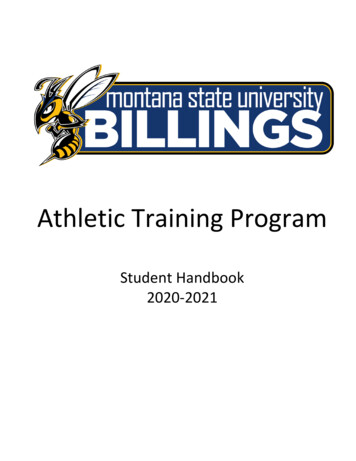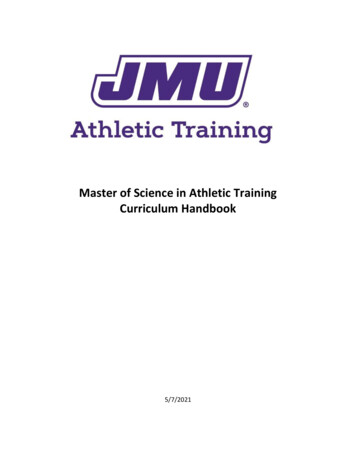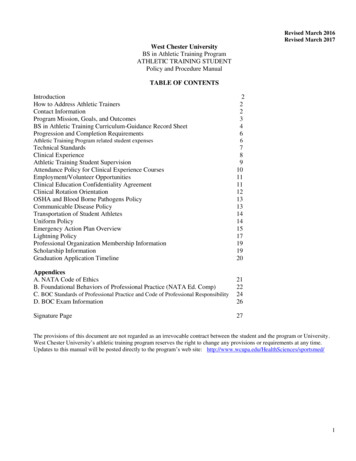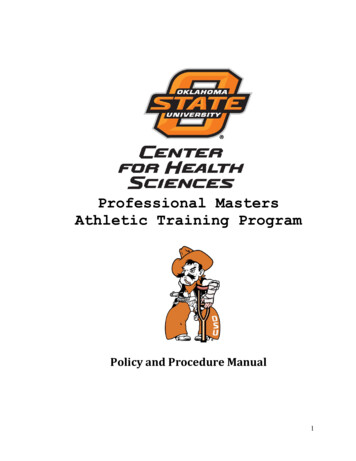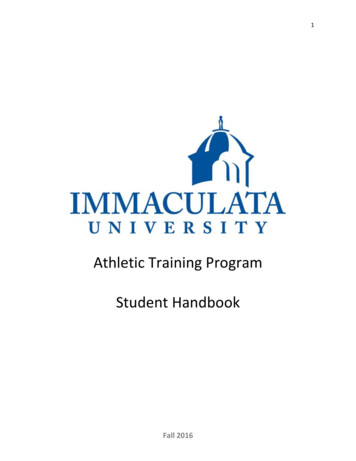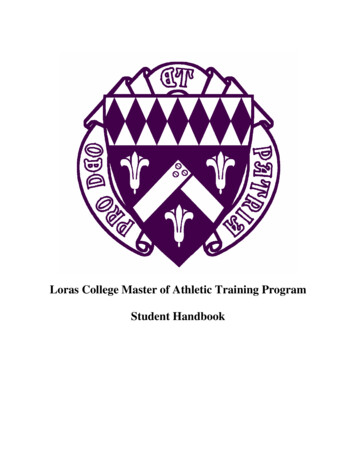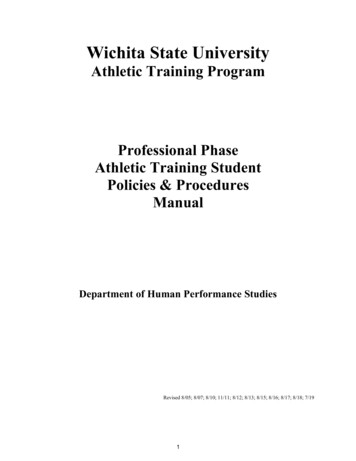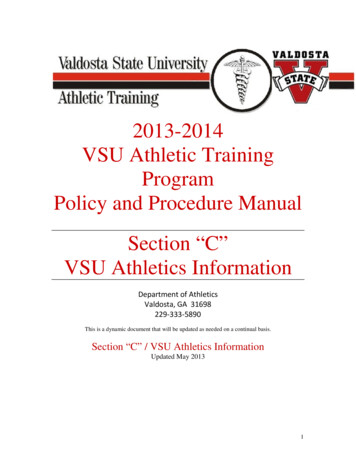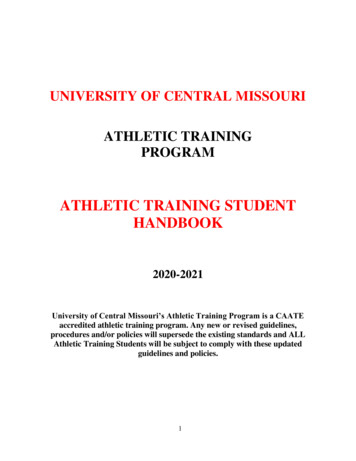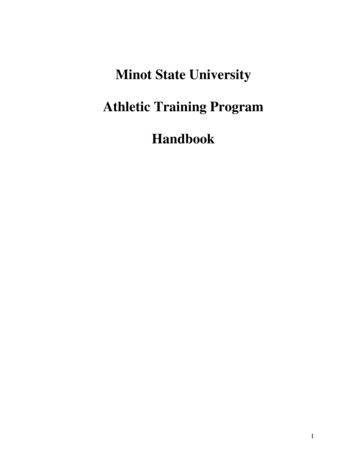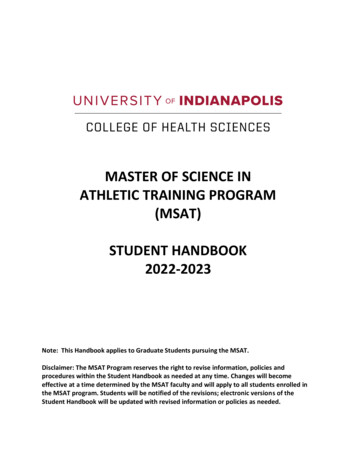
Transcription
Athletic Training Program HandbookMaster of Science in Athletic TrainingWestern Carolina UniversityJune 2022
TABLE OF CONTENTSSECTION I: PROGRAM INTRODUCTION . 4CAATE Accreditation Status . 4Program History . 4WESTERN CAROLINA UNIVERSITY ATHLETIC TRAINING PROGRAM FACULTY . 5SECTION II: VISION, MISSION, CORE VALUES, GOALS, AND OBJECTIVES . 6VISION AND MISSION . 6WCU Vision Statement . 6WCU Mission Statement. 6WCU Core Values and Guiding Principles . 6College of Health and Human Sciences Vision Statement . 6College of Health and Human Sciences Mission Statement . 6College of Health and Human Sciences Core Values . 6School of Health Sciences Vision Statement . 6School of Health Sciences Mission Statement . 6School of Health Sciences Core Values . 7Athletic Training Program Vision Statement . 7Athletic Training Program Mission Statement . 7Athletic Training Program Core Values . 7Athletic Training Program Goals and Objectives . 7SECTION III: ACADEMIC PROGRAM. 9ACADEMIC PROGRAM . 9TECHNICAL STANDARDS . 9PREREQUISITE COURSE REQUIREMENTS . 9GRADUATION REQUIREMENTS . 10RETENTION . 10REMEDIATION . 10DISMISSAL AND READMISSION . 11LEAVE OF ABSENCE . 11DEFERRED ADMISSION. 11SECTION IV: POLICIES AND PROCEDURES . 13CARDIOPULMONARY RESUSCITATION CERTIFICATION . 13NATA MEMBERSHIP . 13CONFIDENTIALITY . 13ATTENDANCE . 13OUTSIDE EMPLOYMENT. 13TECHNOLOGY . 13GRADUATE SCHOOL POLICIES . 13TERMINOLOGY. 14PROFESSIONALISM . 14PROFESSIONAL DIFFERENCES OF OPINION . 14PROFESSIONAL ATTITUDE . 14PROFESSIONAL COMMUNICATION . 15PROFESSIONAL RELATIONSHIPS . 15Relationships with Athletes and Patients . 15Relationships with Coaches and Preceptors . 15Unwanted Attention during Clinical Education . 16PROFESSIONAL JUDGMENT . 16WCU SEXUAL HARASSMENT AND OTHER UNLAWFUL HARASSMENT POLICIES . 16Policy Statement on Title IX Sexual Harassment . 16Policy Statement on Non-Discrimination and Equal Opportunity . 16Page 2 of 38
ATHLETIC TRAINING PROGRAM POLICY ON SEXUAL HARASSMENT . 16ATHLETIC TRAINING PROGRAM NON-DISCRIMINATION POLICY . 17SOCIAL NETWORKING POLICY . 17DRESS CODE POLICY . 17Basic Requirements . 18Grooming . 18Jewelry. 18Tattoos and Body Art . 18Hats . 18Attire . 18DRUG AND ALCOHOL POLICY. 20Alcohol Use and Abuse . 20Drug Use and Abuse . 21Drug Testing Policy. 21CRIMINAL BACKGROUND CHECKS . 21LIABILITY INSURANCE . 21POLICIES FOR CLINICAL SITE ASSIGNMENT . 21REQUESTING A NEW CLINICAL EDUCATION SITE . 22CLINICAL EDUCATION DURING UNIVERSITY BREAKS . 22ABSENCE FROM CLINICAL EDUCATION EXPERIENCE . 23ATTENDANCE DURING INCLEMENT WEATHER . 23SUPERVISION OF THE ATHLETIC TRAINING STUDENT . 23CLINICAL EDUCATION EXPERIENCE EXPECTATIONS . 24ATTENTIVENESS DURING CLINICALS . 24TRAVEL POLICY . 25CELLULAR PHONES AND OTHER DEVICES . 25CLINICAL HOURS AND PATIENT TRACKING . 25PROFICIENCIES . 25CLINICAL EDUCATION EVALUATIONS . 26Preceptor Evaluation of Student Performance . 26Preceptor Evaluations . 26Clinical Site Evaluations . 26SECTION V: HEALTH AND SAFETY . 27REQUIREMENTS. 27INJURY/ILLNESS IN DIDACTIC EDUCATION . 27INJURY/ILLNESS IN CLINICAL EDUCATION . 28EXISTING CONDITIONS . 28HEALTH INSURANCE . 28PREGNANCY. 28BLOOD BORNE PATHOGENS POLICY . 28COMMUNICABLE AND INFECTIOUS DISEASE POLICY . 29OSHA REGULATIONS . 29EMERGENCY ACTION PLANS . 29CALIBRATION AND MAINTENANCE OF EQUIPMENT . 29SECTION VI: CORRECTIVE ACTIONS AND GRIEVANCES . 30CORRECTIVE ACTION PROCEDURES . 30GRIEVANCES . 31GRADE APPEAL AND PROGRAM DISMISSAL . 32SECTION VI: APPENDICES . 33APPENDIX A: DEFINITION OF TERMS . 34APPENDIX B: TECHNICAL STANDARDS . 37Page 3 of 38
SECTION I: PROGRAM INTRODUCTIONThe Athletic Training Handbook has been designed to maintain an effective and efficient athletictraining program at Western Carolina University (WCU). The contents of this manual aredesigned to provide policies and procedures to guide quality athletic training education alongwith safe, prudent, and effective care for the patients with which we interact. This document willserve as a required and referenced text for all athletic training courses throughout the program.Furthermore, the athletic training faculty and preceptors will use this manual as a guide foradministrative and professional decisions pertaining to the Athletic Training Program. It isimperative that athletic training students are knowledgeable of the contents of this manual. Anyquestions about the content of this document should be directed to the Athletic Training faculty.CAATE Accreditation StatusThe Western Carolina University Athletic Training Program achieved its initial accreditation in 2007and its reaccreditation, for the maximum allowable 10 years, in 2012. In 2019, the Athletic TrainingProgram was approved to move to the post-baccalaureate level beginning in 2020. The WesternCarolina University Athletic Training Program will undergo re-accreditation in 2022-2023.Program HistoryThe athletic training program at Western Carolina University, established in 2004, admitted its firstclass for the 2004 – 2005 academic year. Dr. James Scifers was the founding Director of the Programand was hired in 2003. Professor Jill Manners was hired in 2004 as the founding Clinical EducationCoordinator. The Athletic Training Program was initially housed in the Department of Health Sciencesin the College of Applied Sciences and was based in Moore Hall, Room 306. In 2007, the programgraduated its first class of 12 students, all of whom became certified and licensed athletic trainers. In2010, Jill Manners became Program Director. In 2017, Dr. Melissa Snyder stepped into the role ofProgram Director, Tara Peterson assumed the role of Coodinator of Clinical Education, and Dr.Ashley Thrasher became the Didactic Education Coordinator. In 2020, Dr. Ashley Thrasher assumedthe role of Program Director for the Master of Science in Athletic Training Program while Dr. MelissaSnyder continued as the Program Director for the undergraduate program until 2022.In 2020, the Athletic Training Program moved to the post-baccalaureate level. The last graduatingclass at the baccalaureate level is the Class of 2022. The inaugural cohort for the Master of Sciencein Athletic Training (MSAT) cohort began in 2020. Currently, this program is housed in the College ofHealth and Human Sciences and within the School of Health Sciences. The Athletic Training Programis housed in the Health and Human Sciences Building, rooms 351 – 355.Current and Previous Athletic Training Faculty Members:Nicholas Martin, MS, LAT, ATCDoug Branch, MS, LAT, ATCAshley Long, PhD, LAT, ATCC. Robert Dingle, HSD, LAT ATCJames Scifers, DScPT, PT, SCS, LAT, ATCKent Scriber, EdD, LAT, ATC, FNATAJill Manners, MS, MPT, LAT, ATC, PT, COMTJulie Miller, MAEd, ATCTara Peterson, MS, LAT, ATC, CSCSMelissa Snyder, PhD, LAT, ATC, CSCSAshley Thrasher, EdD, LAT, ATC, CSCSJessica Kirby, EdD, LAT, ATC2006 – 20072010 – 20112008 – 20132011 – 20142003 – 2015Spring 20162004 – 20182018 – 20202013 – Present2014 – Present2016 – Present2020 – PresentPage 4 of 38
Current and Previous Adjunct FacultyErin Grimsley, MS, LAT, ATCLynette Gibson, MS, LAT, ATCEmily Mitzel, MS, LAT ATCAngela Arndt, MS, LAT, ATCSarah Gilleland, MS, LAT, ATCWestern Carolina University Athletic Training Program FacultyAshley Thrasher, EdD, LAT, ATC, CSCSProgram DirectorAssociate ProfessorWestern Carolina UniversityHHSB 364Cullowhee, NC 28723Office: (828) 227-3511Fax: (828) 227-7446Email: abthrasher@wcu.eduTara Peterson, EdD, LAT, ATCCoordinator of Clinical EducationAssistant ProfessorWestern Carolina UniversityHHSB 424Cullowhee, NC 28723Office: (828) 227-3506Fax: (828) 227-7446Email: tdpeterson@email.wcu.eduMelissa Snyder, PhD, LAT, ATC, CSCSAssociate ProfessorWestern Carolina UniversityHHSB 363Cullowhee, NC 28723Office: (828) 227-3505Fax: (828) 227-7446Email: mmsnyder@email.wcu.eduJessica Kirby, EdD, LAT, ATCTeaching Assistant ProfessorWestern Carolina UniversityHHSB 362Cullowhee, NC 28723Office: (828) 227Fax: (828) 227-7446Email: kirbyj@wcu.eduPage 5 of 38
SECTION II: VISION, MISSION, CORE VALUES, GOALS, ANDOBJECTIVESWCU Vision StatementTo be a national model for student learning and engagement that embraces its responsibilitiesas a regionally engaged university.WCU Mission StatementWestern Carolina University creates learning opportunities that incorporate teaching, research,service, and engagement through on campus, off campus, on-line and internationalexperiences. The university focuses its undergraduate, master’s and three doctoral programs,educational outreach, research, creative, and cultural activities to sustain and improve individuallives and enhance economic and community development in Western Carolina and beyond.WCU Core Values and Guiding Principles1. Excellence in Teaching, Learning, Scholarship, and Service2. Collaboration with and Respect for our Communities3. Free and Open Interchange of Ideas4. Responsible Stewardship and Organizational Effectiveness5. Organizational and Environmental Sustainability6. Cultural Diversity and Equal OpportunityCollege of Health and Human Sciences Vision StatementTo make a positive and lasting impact on the well-being of the communities we serve.College of Health and Human Sciences Mission StatementThe College of Health and Human Sciences serves students and communities through an activelearning environment that uses interprofessional collaboration and scholarship to develophealthcare professionals skilled in patient-centered care, evidence-based practice, qualityimprovement, innovative technology, and community engagement. We value serving the peopleof Appalachia.College of Health and Human Sciences Core Values1. Integrity2. Inclusive Excellence3. Respect4. Service5. Compassion6. Leadership7. Collaboration8. AltruismSchool of Health Sciences Vision StatementThe School of Health Sciences aspires to develop exceptional leaders in the health professionsthrough active learning and community engagement in a multi-disciplinary, collaborativelearning environment.School of Health Sciences Mission StatementThe School of Health Sciences cultivates exceptional health professionals.Page 6 of 38
School of Health Sciences Core Values1. Respect2. Integrity3. Excellence4. Collaboration5. Student-CenteredAthletic Training Program Vision StatementThrough a comprehensive and innovative experience, the Western Carolina University AthleticTraining Program aspires to be a recognized leader in preparing highly skilled andprofessionally progressive leaders in the field of athletic training.Athletic Training Program Mission StatementThe mission of the WCU AT Program is to develop exceptional athletic training clinicians whoprovide patient-centered holistic care.Athletic Training Program Core Values1. Inclusiveness2. Collaboration3. Advocacy4. Respect5. EngagementAthletic Training Program Goals and ObjectivesGoal 1: The WCU Athletic Training Program will provide a comprehensive didactic andclinical education program to prepare graduates to become proficient athletic trainers.Objective 1.1: Graduates will pass the Board of Certification (BOC) Exam.Objective 1.2: Graduates will secure employment as athletic trainers.Objective 1.3: Students will matriculate through the Athletic Training Program withinthree years.Objective 1.4: Students will engage in high-quality clinical education experiences.Goal 2: Graduates will provide high quality patient-centered care independently asathletic trainers.Objective 2.1: Demonstrate the ability to evaluate, synthesize, and apply athletic trainingknowledge and skills in order to develop a comprehensive plan of care.Objective 2.2: Demonstrate professional behaviors (e.g., ethical, moral, legal) consistentwith professional and employment expectations for the entry-level athletictrainer.Goal 3: Graduates will collaborate as a member of an inter-professional healthcare teamwhile providing patient-centered careObjective 3.1: Students will demonstrate professional behaviors while interacting with avariety of healthcare professionals providing patient-centered care.Objective 3.2: Students will demonstrate verbal and written communication skills in orderto successfully interact with stakeholders, maintain accurate medicalrecords, and appropriately disseminate information.Page 7 of 38
Goal 4: Graduates will be able to critically evaluate current literature in order to guideclinical practice and address complex issues in Athletic TrainingObjective 4.1: Students will use appropriate patient-centered clinical questions to identifyand critically appraise current literature to guide clinical practice andaddress complex issuesObjective 4.2: Students will apply the available evidence and patient goals / values toimplement current, safe, and effective patient care for complex issues.Goal 5: Graduates will demonstrate professional engagement and serve the communityin which they live.Objective 5.1: Students will serve the community by participating in volunteer activities.Objective 5.2: Students will be engaged in the profession as demonstrated by attendingand presenting at professional conferences.Objective 5.3: Students will evaluate the various determinants of health (e.g., social,economic, environmental, biological, policy/law, cultural) which may affectcommunity healthcare.Goal 6: The faculty of the WCU Athletic Training Program will maintain contemporaryexpertise to provide high quality instruction.Objective 6.1: Faculty will participate in comprehensive analysis and reflective practiceto improve instruction.Objective 6.2: Faculty will engage in one professional development event directly relatedto one or more of their respective course assignments for the year.Objective 6.3: Tenured/tenure-track faculty members will engage in scholarship todemonstrate contemporary expertise.Page 8 of 38
SECTION III: ACADEMIC PROGRAMAcademic ProgramThe Master of Science in Athletic Training (MSAT) degree at Western Carolina University meetsall academic and clinical requirements to allow students who successfully complete the programto be eligible to apply for the Board of Certification (BOC) Examination to become a CertifiedAthletic Trainer. The MSAT at Western Carolina University is currently accredited by theCommission on Accreditation of Athletic Training Education (CAATE). The Athletic TrainingProgram fulfills the educational Standards as defined by the Commission on Accreditation ofAthletic Training Education and Practice Analysis 7th edition (2016) by the Board of Certification(BOC). These documents serve as guides for the construction of the BOC CertificationExamination for Athletic Trainers. The NATA Code of Ethics and the BOC Standards ofProfessional Practice serve as guides regarding professional code of conduct. Thesedocuments provide the foundation for professional practice within the WCU Athletic TrainingProgram and are expected to be followed at all times. Successful completion of the AthleticTraining Program requires successful completion of all academic and clinical requirements.Technical StandardsThe Athletic Training Program at Western Carolina University is a rigorous and intense programthat places specific requirements and demands on the students enrolled in the program. AthleticTrainers and Athletic Training Students must possess mental, physical, and behavioral abilitiesthat are essential in providing patient care to a wide variety of patients/clients. The technicalstandards set forth by the Athletic Training Program establish the essential physical and mentalskills and abilities a student needs to fulfill the academic and clinical requirements of theprogram. In the event a student is unable to fulfill these technical standards, with or withoutreasonable accommodation, the student will not able to begin the program or may be dismissedfrom the program. Compliance with the program's technical standards does not guarantee astudent's eligibility for the BOC certification exam. See Appendix B for technical standards.Prerequisite Course PolicyThe prerequisite coursework required for the MSAT Program includes the following: 8 Credits of Anatomy and Physiology (must include lab) 4 Credits Biology (must include lab) 4 Credits Chemistry (must include lab) 4 Credits Physics (must include lab) 3 Credits Psychology (introduction) 3 Credits NutritionStudents must successfully complete the pre-requisite coursework with a “C” or higher.Prerequisite courses may be completed at a community college or through early college (postsecondary education); but must receive a letter grade score (e.g., A, B, C, D, F). AdvancedPlacement courses do not satisfy the prerequisite requirement. Courses must occur at the postsecondary level.Prerequisite courses will be evaluated by the MSAT program faculty at the time of application.To determine if the courses are appropriate for prerequisites, the course prefix and title areevaluated. If there is a course that does not have a title that clearly demonstrates theprerequisite course is met (e.g., Introduction to Biology vs. Cells and Molecular Function), thefaculty will request a course description to determine if requisite information is met. If the facultyPage 9 of 38
cannot make that determination from the course description, they will request the syllabus. Thefaculty will then evaluate the syllabus to determine if the appropriate course content is met.If students have not completed all the prerequisite courses at the time of application, faculty willstill review the application; however, any offers of admission will be contingent on successfullycompleting all the prerequisite courses with a grade of “C” or higher. Students must complete allprerequisite courses prior to beginning the MSAT program.**Due to Covid-19, some universities instituted satisfactory/unsatisfactory (S/U) grading. TheMSAT faculty determined S/U grades would be accepted if courses are completed at anaccredited post-secondary institution. Advanced Placement courses still do not satisfy theprerequisite requirements.Graduation RequirementsTo complete the Athletic Training Program, students must fulfill the following requirements:1. Successfully complete each course with a B or higher and a minimum cumulative GPAof 3.0. Students may receive a maximum of one C during the Athletic Training Program.2. Successfully pass yearly comprehensive exams3. Successfully complete all proficiencies4. Successfully complete all clinical experiences5. Meet the annual Professional Development Unit requirementsRefer to the Graduate School catalog for more information about graduation requirements andinformation.RetentionThe student is retained in the Athletic Training Program if the student maintains acceptableacademic achievement, clinical progress, and appropriate professional conduct. Students maybe placed on probation or dismissed from the Athletic Training Program for failure to meet theretention requirements. Remediation may be required for students placed on probation. In orderto be retained in good standing:1. Students are required to successfully complete all didactic and clinical coursework2. Students are required to take all courses as outlined in the 6-semester plan3. Students are required to pass all practical examinations4. Students are required to practice the profession of athletic training in an ethical manner5. Students are required to exercise good professional judgment6. Students are required to adhere to all policies and procedures as outlined in the AthleticTraining Handbook7. Students are required to maintain an overall 3.0 Grade Point Average8. Students must earn a grade of B or better in all courses. One C is permitted.9. Students are required to join/renew membership to the National Athletic Trainers’Association each year10. Students are expected to attend and actively participate in all required program sessionsincluding but not limited to courses, guest lectures, program meetings, andcomprehensive examinations.RemediationIf a student is placed on probation for any reason, remediation may be required. Remediationwill be developed for students on a case-by-case basis guided by the area that needsremediation. Remediation may include, but is not limited to, additional readings, assignments,retaking practical examinations, or professional development activities. The Program DirectorPage 10 of 38
will notify students who are placed on probation. The faculty will determine the method ofremediation, which will be communicated to the student by the Program Director. Once thestudent successfully completes remediation requirements, the Program Director will remove theprobationary status and notify the student.Dismissal and Readm
In 2019, the Athletic Training Program was approved to move to the post-baccalaureate level beginning in 2020. The Western Carolina University Athletic Training Program will undergo re-accreditation in 2022-2023. Program History The athletic training program at Western Carolina University, established in 2004, admitted its first
